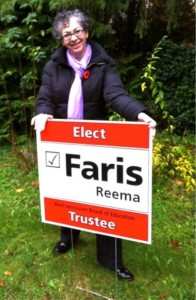Posts Tagged ‘Municipal Election’
Crazy Little Thing Called Twitter And The FSAs
At first I lurked.
I’d log on to Twitter.com and scroll through the streams, fascinated.
I started to tweet in support of my campaign during the 2011 civic election and now it’s part of my daily routine.
With Twitter, I keep an eye on my community. I get news from around the world. I read analyses of issues and events from different perspectives. I interact with well-known figures and people in faraway places, opportunities I may never have had otherwise.
Twitter is also ugly at times, “nasty, brutish, and short” in the words of Thomas Hobbes. And while it is liberating to talk to so many so easily, Twitter is also constraining.
Why?
My Twitter account is a mirror of who I am as a whole person, but that whole person includes being a public figure. I have to be aware that although I am speaking personally, some may mistakenly take my views as those of the West Vancouver Board of Education. I have to be aware that while I distinguish between the different hats I wear in life and the various roles I play, others may not.

Which brings me to the Foundation Skills Assessment (FSAs), a test administered to Grade 4 and Grade 7 students throughout British Columbia.
Twitter streams were on fire about the FSAs recently, but I kept mum. I felt that whatever I said in 140 characters could be mischaracterized.
Here’s some of what I wanted to say.
As a parent, I had no objection to my child writing the FSA. As a Trustee, I see value in the data collected because it can be used to align resources with demonstrated need.
Here’s the problem: what we want the FSA to do and what is done with the FSA results have diverged.
FSA data, in addition to use by the provincial government and by school districts, is used by a third-party organization to rank schools.
The Fraser Institute rankings are myopic: they claim to present an overall picture of a school, but the rankings seem to be unduly weighted on one factor, FSA scores.
Rather than the FSA, why not invest in developing literacy screeners for key grades, the results of which would be privately held and exclusively used by the school, the district, and the student’s family? I’m thinking of something like the early literacy screening used for kindergarten students in West Vancouver.
And while I acknowledge that provincial measures are needed for accountability purposes, perhaps a better method of tracking student performance could be determined through a consultative process with key partner groups.
Perhaps by separating the two requirements — diagnostic and reporting — and by creating mechanisms for each, we would be spared the yearly rankling spectacle of school rankings.
At our January public board meeting, Sandra-Lynn Shortall, District Principal – Early Learning, paraphrased a conversation she’d had with Dr. Stuart Shanker. “Early intervention,” she said, “is not the answer to helping students address their needs, rather it’s continuous intervention and connectedness.”
Just as Twitter is not always the best mode of communication, the FSA may not be the best mechanism to match vulnerable or struggling students with the continuing supports they need to succeed in our public education system.
I think we can do better.
Year One Retrospective
A year ago, I was elected as a Trustee to the West Vancouver Board of Education and it’s been an honour to work on behalf of this community. I’ve lived most of my life here, I’m a graduate of the school district in which I now play a role, and I’m fortunate I’m able to raise my child here.
As a public education community, we’re very lucky in West Vancouver. We have a great administrative team, we have inspiring leadership from our Superintendent, we have incredible staff, we have a caring Board, and we have a cadre of educators who are diligent, dedicated, and determined to deliver the highest quality teaching and learning.
We’re also favoured in that our community highly values education and families here generally have the means to ensure the best for their children. And yet, even with all these advantages, I see any number of troubling issues which appear to characterize the public education system in British Columbia.
And so, when I’m asked about my experience as a Trustee, my inclination is to say that the system is more complex and complicated than I realized despite having been an active parent-volunteer for five years before choosing to run for office.
Why?
In part, I think, because there are many different interpretations of the generally agreed upon underlying principle which I see as “the best interest of the child”.
Is the core purpose of education the success of the individual child or is it the betterment of society? Do parents know what’s best for their child or do teachers? Is an educator an autonomous professional or an expert member of a team?
I’m sure any one of us could generate an endless list of questions on the big picture of education, but then there are the practicalities. How is the provincial government able to show that funding per pupil is at an all time high while school districts have to nip, tuck, or cut programs and services in order to balance budgets? Given that 80% of a school district’s budget is consumed by salaries and benefits, how can innovative projects be implemented when resources are so constrained? How can infrastructure be maintained and new capital projects be contemplated with no additional funding?
Despite the seemingly intractable challenges, there’s no doubt in my mind that we have to do everything we can to foster dialogue on this issue. That education needs to be made the highest priority in this province, that we have to find a way to work collaboratively to make our strong system better.
The reason is simple. Education is the path to a more just and more equitable world.
And while it may be difficult to hold on to this truth given the evidence of the harm humans continue to do to the earth and to each other, it is why I remain committed to doing the best I can, for public education, in the remaining two years of my term.
Why I Am Running
My name is Reema Faris and I’m running as a candidate for Board of Education Trustee in West Vancouver.
Why?

I have a profound belief in the value of education and the benefits of learning as well as a passion for the public education system.
Consider, too, that the BC Ministry of Education is pushing the concept of “personalized learning in the 21st century”. Why? What does it mean? Well, I want to be at the table to make sure that if there’s an overhaul of the system it’s done well and it’s done right. That it’s implemented in a way which benefits all students.
Here are some of the other issues I’m thinking about:
• how do we engage students so that they take ownership and responsibility for their own learning at all levels?
• which programs and practices will best help students develop critical thinking skills, good study habits, and build character and resilience?
• are we able to provide better leadership & communications training for administrators, teachers, and staff?
• how do we manage technology in our curriculum and in the classroom, and how do we make sure that the Arts are not overlooked?
• what measures can we take to enhance community connections and make better use of combined resources?
• which steps do we have to take to complete the French Immersion Review that’s been called for in West Vancouver and how do we ensure the implementation of the resulting recommendations?
• how do we ensure that School District operations are as efficient & effective as possible?
